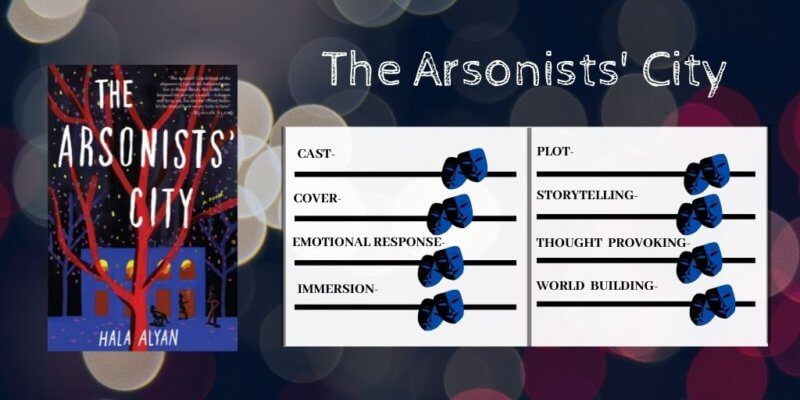One of our goals for this year was to buddy read books set in other places. When the Israel-Palestine conflict was in the news, I thought about The Arsonists’ City which had been sitting on my TBR and mentioned it to Ariel. Hoping to broaden our understanding through fiction, we decided to give this one a read! Take a look at the synopsis and content notes below and then dive into our discussion.

A rich family story, a personal look at the legacy of war in the Middle East, and an indelible rendering of how we hold on to the people and places we call home
The Nasr family is spread across the globe—Beirut, Brooklyn, Austin, the California desert. A Syrian mother, a Lebanese father, and three American children: all have lived a life of migration. Still, they’ve always had their ancestral home in Beirut—a constant touchstone—and the complicated, messy family love that binds them. But following his father’s recent death, Idris, the family’s new patriarch, has decided to sell.
The decision brings the family to Beirut, where everyone unites against Idris in a fight to save the house. They all have secrets—lost loves, bitter jealousies, abandoned passions, deep-set shame—that distance has helped smother. But in a city smoldering with the legacy of war, an ongoing flow of refugees, religious tension, and political protest, those secrets ignite, imperiling the fragile ties that hold this family together.
In a novel teeming with wisdom, warmth, and characters born of remarkable human insight, award-winning author Hala Alyan shows us again that “fiction is often the best filter for the real world around us” (NPR).
Content Notes: Depiction of gun violence, drug use, infidelity, sexual content, civil war.
The Arsonists’ City
Whole book Discussion
As one of our longer reads so far, The Arsonists’ City was a slow start for me but it was so gripping towards the end when I knew all the characters and my interest in their lives was piqued. In another book I read not very long back, one main lesson was understanding that parents had a life of their own before marriage and kids. Growing up, since we never see them in that light, we don’t realize how they came to be the way they are. Through this book, I saw a number of interesting themes that I enjoy reading about – immigration, family roots, family secrets and history, broader historical and geographical context with the setting – this one was an educational book for me for many reasons!
The book takes its time introducing us to each of the characters. By 50%, we fully know their motivations, fears, and insecurities– while also still in the dark about certain past interactions between generations. It became more interesting and engaging as the book progressed, and the large cast provided many perspectives to a particular family history.
Though I generally gravitate towards fewer perspectives in a story, the POVs of the kids and their mother were required to understand what significance the house in Beirut held in each of their lives. And though this family trip was to sell it, the intention was actually much bigger than that. It was about closing a chapter of the past that no one had truly gone past, a chapter that affected the kids in their unique manner.
The house became a catalyst for many of the characters to confront what they had been previously avoiding, and many of the surface-level familial interactions dived much deeper than the characters intended. The ensuing tensions and dynamics that change and shift created a really well-rounded reading experience.
It would not be fair to the book if we do not mention the cultural aspects of the story. I was a bit of a blank slate when it came to Middle Eastern culture and I really liked the integration of music, theatre and night life in the story. What might be assumed to be completely unlike the West doesn’t look very different from our own Western society in modern times.
I really enjoyed the cosmopolitan feel of Beirut and the reminiscence of Syria and Palestine. There are so many layers and dynamics that are explored between generations, and from being a first and second generation refugee in the US and the characters’ grappling with their family history in Lebanon. With themes like art, acting, and music, the characters process their family, their traumas, and their identities.
Concluding Thoughts on The Arsonists’ City
This book made me research Syria, Lebanon and Palestine, which I had not done before. The Arsonists’s City is not meant to be a lesson in history though it does portray the sadness of losing people because of war, the privilege of those who live outside it and the long term repercussions on the life of the affected. One can move away and start afresh but the past never leaves us because it changes us in ways we would never have imagined.

The Arsonists’ City is now available in stores. Be sure to check your local library and request this from them for it to reach more people.
Amazon Print
Amazon Kindle
Thank you for reading! For more book discussions, check out the books with * in the Book Review Index. We will both be back at the end of the month with our horror picks!
Cover Image: Photo by Christian Lue on Unsplash

Be First to Comment